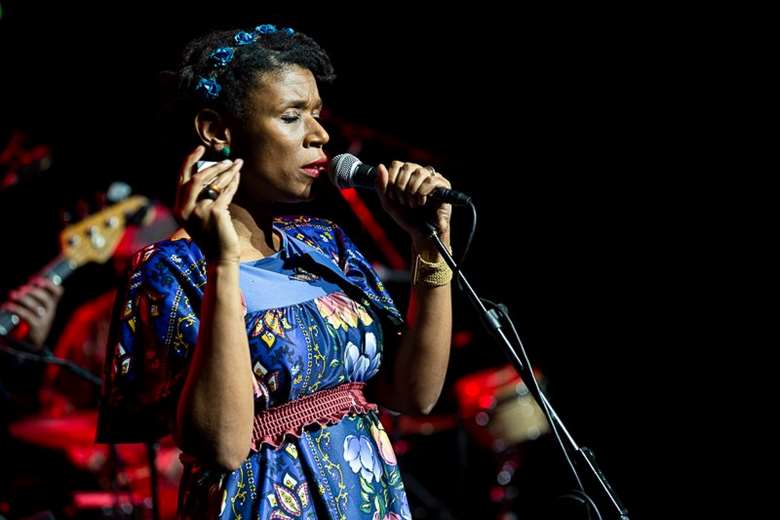Carmen Souza and Roberto Ottaviano captivate at Roma Jazz Festival
Martin Longley
Friday, December 6, 2019
The eclectic Italian jazz festival provides a compelling and exciting programme

The Roma Jazz Festival isn’t one of those crammed weekenders with multiple choice strategies. It takes its time, presenting a month of gigs, having just a single performance each night, with a few dormant days on the way. Concerts take place at the Auditorium Parco Della Musica, in the old 1960 Olympic Village, encircled by a curve of the River Tiber. Much of the festival, born in 1976, features starry Americans, but your Jazzwise scribe was in town for its last five days, which were heavy on indigenous Italian talent.
One exception was Portuguese acoustic guitarist and multi-lingual singer Carmen Souza, who’s steeped in Cape Verdean culture, via her parents, and has lately been living in London. Souza was joined by longtime collaborator Theo Pascal (bass), along with Ben Burrell (piano) and Elias Kacomanolis (drums). There was a particular focus on The Silver Messengers, her album based around the works of pianist Horace Silver, but Souza also dropped in some Nina Simone, Glenn Miller’s ‘Moonlight Serenade’ and a Brazilian classic from Edu Lobo. Her live show is more conventionally entertaining when compared with her often quirky albums, where her voice frequently explores strange intonations and phrasing, and the production veers towards the innovative. Souza still sounded eccentric, but not at the expense of a gliding Lusophone motion, and clap-along tendency. Treatments of Silver’s ‘Señor Blues’ and ‘The Cape Verdean Blues’ were among the highlights, as Souza sometimes altered her high and low tones mid-phrase, always maintaining unpredictability in her vocal constructions. She played piano, and used a ferrinhu scraper instrument, while her guitar playing also worked well as it spidered in-between the spirited pushing of her band. The only misjudgement came at the close, with an interminable bass solo section.

The following night came with a revelation in the shape of soprano saxophonist Roberto Ottaviano (above), whose quartet featured our own Alexander Hawkins on piano. Ottaviano had a remarkable sparring partner on bass clarinet, Marco Colonna forming a sonic contrast, as the high skims and low ripples mixed. The torrential blowing always hung on to a propulsive groove, while flying off the axis. Hawkins melded an out-there freeness with a blues and Latin sensibility, rolling rhythms with his left hand, lashing the keys with his traipsing right.
The improvising dynamics were rooted in an old time swing sensibility, rather than sounding like an angular, cerebral exercise. The set had the momentum of an extended single number, as the foursome barely paused for contemplation. Building and releasing repeatedly, the band rapport was incredibly focused, as they hurtled into the breach over and over again. Several audience members couldn’t handle the energy, steadily departing, but the majority who remained rewarded the quartet with rapturous applause.
The Mare Nostrum trio played on the final night, in the larger hall, featuring Italian trumpeter Paolo Fresu, French accordionist Richard Galliano and Swedish pianist Jan Lundgren. They sound-painted an enjoyable set, but its light atmospherics didn’t hold enough emotional power, tending to drift off into the ether at several points.
A few days earlier, another Italian soprano saxophonist, Gabriele Coen paid homage to the music of Leonard Bernstein, albeit in heavily transformed jazz fashion. This was a well-chosen songbook project, as Bernstein’s work isn’t often translated into the jazz language. There was a sorrowful cello solo on ‘Somewhere’, followed by a citrusy soprano tail, then the leader switched to clarinet for ‘Make Our Garden Grow’ as Benny Penazzi’s cello quavered its romantic message once again.
The next evening, another reedsman, Luigi Cinque led his Hypertext Orchestra, a kind of Afro-prog improvising jam-band who were deliberately lacking in discipline, taking chances as they roiled up grooves, their contrasting pair of singers fronting the band’s ritual display. Badara Seck was surprisingly introverted, but he had fierce competition from Petra Magoni, who was hyperactive, theatrical, punky and operatic, a restless attention-grabber, but also somewhat entertaining in her unpredictability.